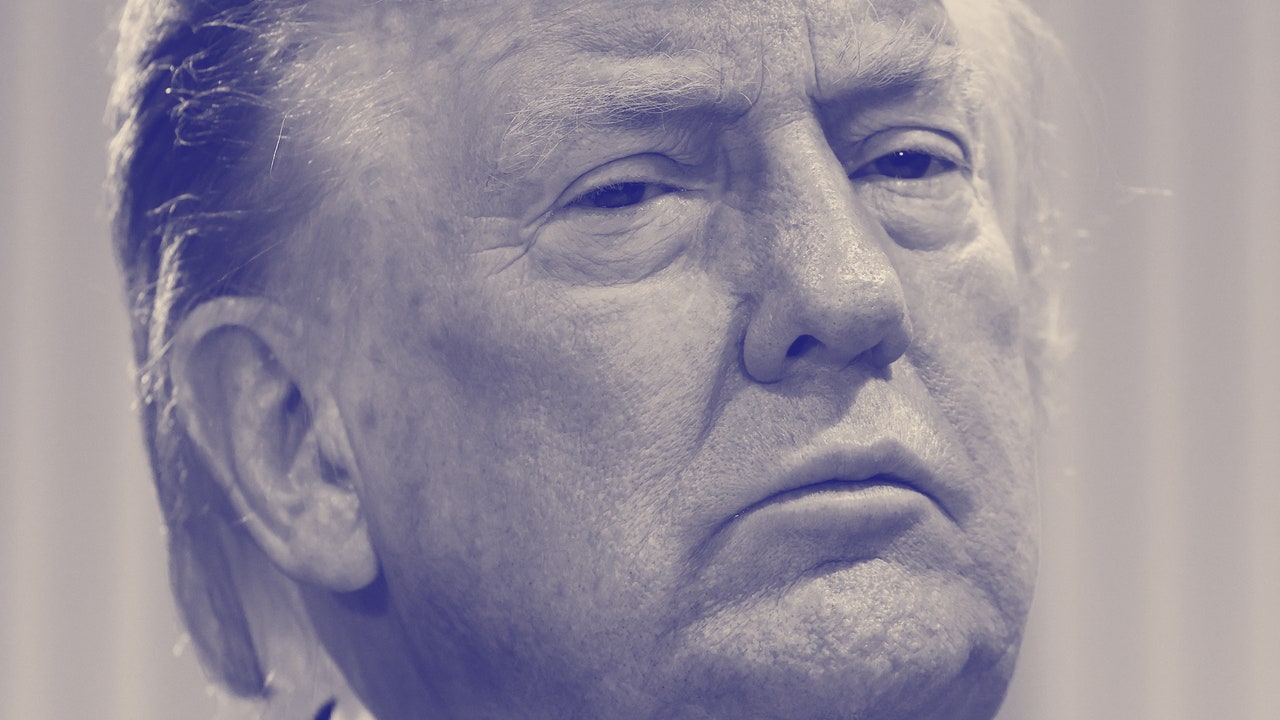Last week, Israel began an extensive bombing campaign on Iran, in what the Israeli Prime Minister, Benjamin Netanyahu, has claimed is an attempt to wipe out the country’s nuclear program. Iran has fired back missiles in response, but Israel’s military superiority has been clear: it has damaged nuclear sites and energy facilities across the country, and has assassinated key figures in Iran’s military leadership. President Donald Trump, who has for months been saying that he would like to sign a nuclear deal with Iran—and who, in 2018, pulled out of the agreement that Barack Obama’s Administration had negotiated—has nevertheless offered significant military and rhetorical support to Israel’s current campaign. Despite what seemed like some initial reluctance to support an Israeli attack, he has now repeatedly threatened Iran, and its Supreme Leader, and called for an evacuation of Tehran. He has indicated that the United States may formally enter the conflict, perhaps in an effort to destroy Iran’s Fordow Fuel Enrichment Plant, which is considered reachable only with American weaponry.
To weigh this possibility, and to reflect on the United States’ role in the conflict, I recently spoke by phone with Aaron David Miller, a senior fellow at the Carnegie Endowment for International Peace. He previously worked at the State Department, and played a role in Middle East peace negotiations for decades, most notably at the end of the Clinton Administration. During our conversation, which has been edited for length and clarity, we discussed why Trump decided to support Israel’s war against Iran, what the Iran conflict reveals about the U.S.-Israeli relationship, and why people continue to misunderstand Trump’s approach to foreign policy.
What is your understanding, as of now, of how the Trump Administration became embroiled in the conflict between Israel and Iran?
I think it reflects a President who basically does not want a major conflict, and who didn’t want to involve the United States in a major conflict, but has not tried or figured out a way to get out of the conflict or to make American intervention less likely. That is his dilemma. We’ve got F-35s out there. We’ve got Aegis missile systems. We’ve got Patriots. He’s given the Israelis a tremendous political margin for support. He’s beaten back many of the MAGA enthusiasts who think that supporting Israel is throwing good money after bad. And he has now even provided rhetorical support.
So, if he didn’t want to get the United States involved, why is he doing these things?
To Donald Trump, it’s always a question of, How do I look? Am I being played? Am I being perceived as weak? Did I overcommit or overpromise the possibility of a deal with Iran? I think he’s trying to make a virtue out of necessity. But, whenever Trump was briefed that the Israelis were about to strike, he had the capacity and the personality and the power to tell Netanyahu to wait and, at a minimum, to get time.
The Times reported, on Tuesday, that the Administration felt boxed in, essentially, and that Netanyahu was going to conduct a military assault on Iran regardless. And so, to some degree, they had to go along because they couldn’t stop it. You seem to be saying that, in fact, they did have a certain amount of power.
Let me tell you why I think that. It’s not a popular view, and it’s not a view that many people hold. Donald Trump, in the last six weeks, has done things in and around and to Israel that no Republican President and no Democratic President I ever worked for, from Jimmy Carter to George W. Bush, has ever done. He has blown through two of the three basic political laws of gravity that have governed the U.S.-Israeli relationship. One is no daylight. In March, he, without Israel’s permission, authorized his hostage negotiator to open a dialogue with Hamas, a group that had already killed American citizens and had been responsible for the deaths of Israeli-American dual nationals. He cut a deal with the Houthis without the knowledge of the Israeli Prime Minister, which implicitly said that, as long as you don’t attack our naval assets, we have a ceasefire. He didn’t say anything about drones and ballistic missiles against Israel. Then, over the objections of Netanyahu, he removed sanctions on the new President of Syria. And he summoned Netanyahu to Washington from Budapest in April. Presumably, the Prime Minister thought he was coming to negotiate down tariffs. And then Trump announces, with the Prime Minister of Israel standing next to him, that he’s now opened direct negotiations with Iran. No other American President would have done something in this way. So that’s the no-daylight policy being discarded.
Second is the imperviousness to political costs or consequences. Had a Democratic President done the things that I just identified, somebody would have called for their impeachment. Trump’s margin for dealing more independently and more critically with the current Prime Minister of Israel is much larger than any American President has ever had. And this posture dates back to the first Trump term, when he believed that Netanyahu was using him. He doesn’t have the same emotional commitment to the idea of Israel, the people of Israel, the security of Israel that Joe Biden had. Israel to him is a means to an end.
The third political law of gravity that’s governed the relationship is aversion to serious and sustained pressure. Despite violating the first two, he wouldn’t or couldn’t get to No. 3. On an issue of extreme importance to Israel, which involved American equities and interests and potentially American lives, he couldn’t bring himself to say, “Look, you know, I know you have got to do what you have got to do, but I can’t be there for you. I need more time.” He may not have said “Attaboy” and green-lighted this thing, but he clearly didn’t say no.
When I read the Times piece, I thought, O.K., this is something that we’ve seen before: an American Administration leaking that they were backed into a corner by the Israelis, that they had no choice. And what you seem to be saying is that Trump and his Administration actually had the political leeway that other American Administrations felt like they did not have, and he just didn’t take it. So we’ve ended up in the same situation that we’ve ended up in before, even though this could have been avoided without the same political cost.
Yeah, I’m suggesting to you a counterfactual. And others may say, “Oh, don’t be ridiculous, Aaron. Trump understood that Iran is a bad actor. There was no doubt in his mind.” I don’t buy that because I don’t think he’s committed to Netanyahu. Certainly he doesn’t care about the humanitarian situation for Iranians or Palestinians.
Let me put it this way. Trump is now managing three U.S.-mediated conflicts: Russia-Ukraine, Israel-Hamas, Israel-Iran. He has no effective strategy for how to deploy or to even try to deploy U.S. influence or leverage on any of them. He is situational. He is transactional. In the end, he has no strategy. Netanyahu came to him with a plan, and he may have had doubts but he didn’t say no. And once the plan was executed he responded with no broader concerns or worries about what the day after is going to look like. I think he’s moved away from being a guy who had serious doubts, worried that he was backed into a corner, and now he is, I think, reluctantly committed to, well—
He doesn’t seem reluctant in his public comments.
Right, the reluctance is gone, because what’s happened is, I think, he respects success and power. The Israelis have demonstrated success and power against a very bad actor. So, having passed up the opportunity to basically say, “No, give me more time,” he’s now contemplating the use of American military force in conjunction with the Israelis. Not to simply add on to what the Israelis are doing but to bring American power to bear, to do the one thing the Israelis cannot do that Americans can: long-range refuelling and massive-ordnance penetrators delivered by B-2 bombers that can be used to go after Iran’s Fordow reactor. And I would bet in his mind he’s not giving up the idea that getting involved could actually somehow translate itself into leverage.
He could go to Netanyahu and say, “Look, you see what I just did? We have to think about the day after and you have to stop.” But this is where I think it breaks down. I think the Iranians are going to respond. They have thousands of short-range ballistic missiles. Geography is destiny. They’ve already demonstrated in September, 2019, that they could orchestrate an attack on Saudi oil facilities with cruise missiles and drones. I’m not sure what the Iranians will do given the asymmetry of power, but there’s a very real possibility that they will strike U.S. assets in Iraq, in Syria, and in the Gulf. So that’s the day after.
And I should add that, unless Trump is prepared to move toward regime change, the Americans and Israelis cannot destroy the Iranian nuclear program. There are three models for regime change in the region. No. 1 is Egypt, or Tunisia—millions of Egyptians and Tunisians out in the streets, and security forces refuse to fire. No 2.: You have an organized, cohesive military force that has credibility—in the Syrian case, it was an Al Qaeda affiliate backed by the Turks. They didn’t even know how quickly they could get to Damascus. The hollowness of the regime facilitated this. The third option is Iraq and Afghanistan. None of these regime-change scenarios are appropriate or relevant to the situation that exists in Iran. So the question becomes: even if they destroy Fordow, can they permanently destroy an Iranian nuclear program? What is to stop reconstitution?
Do you think Israel’s goal is really to wipe out the nuclear program or is it broader?
I think Netanyahu has a problem. Can they really cease and desist knowing that they didn’t hit the main nuclear site? If you don’t hit Fordow, you can’t even make a credible claim that you demolished the program or constrained it for more than six months, maybe. No, Netanyahu needs Trump, and Trump may figure he needs to do this in order to get the Israelis to stand down. But he would have to show resolve.
In that case, it is not going to work because Trump does not have the resolve to see something complex through.
Right, so then it’s a military campaign, and what is the end result? What’s the day after an American strike going to look like? What happens? The Americans can maybe set the nuclear program back a year or two. Is the plan to do more strikes every three months? I don’t think that’s sustainable.
In terms of the broader relationships here, the U.S. always claims to have been put into a box by the Israelis. You and I talked about this during the Biden Administration. What does it say about our relationship to Israel that we keep finding ourselves in this place, or at least claiming to?
We are infantilizing the American Presidency. Look, I understand Biden and I am sympathetic to him.
You are the last person in America.
From the moment I saw his speech, after October 7th, about a black hole of loss, there was no way Biden could borrow from the three baskets that were available to him: restrict U.S. military assistance or make it conditional, introduce U.N. Security Council resolutions or vote for someone else’s, or unilaterally recognize Palestinian statehood and basically go on a campaign to question the value and the integrity of his Israeli partner.
Trump boxed himself in. He boxed himself in, in my judgment, by setting unrealistic deadlines for negotiations. He boxed himself in because he didn’t focus at all on the looming possibility that this Israeli government was seriously thinking of striking Iran. I also don’t think he drew the lesson from watching Netanyahu for six months in Gaza. Netanyahu wanted “total victory,” not negotiation. Had Trump not proposed these incremental hostage releases, there would have been no negotiation. There would have been no humanitarian assistance into Gaza. He also misread the Iranians in negotiations. And he misread the Israelis in terms of Netanyahu’s capacity to be flexible and to default to the military option. He refused to acknowledge that Netanyahu is no longer the risk-averse Prime Minister he was when I worked on this issue. He is now risk-ready and willing to go beyond his predecessors. Trump boxed himself in, because he’s not paying attention. He’s not focussed. He made the same mistake with Volodymyr Zelensky and Vladimir Putin. The conventional narrative that this is all a result of a crafty, clever Israeli Prime Minister who played Donald Trump? I’m sorry, no. He wasn’t willing to stand up and say no.
I agree with you about this infantilizing narrative that the Israelis play the Americans—there’s something silly about it. I would just say, though, that there’s also something tragic about the fact that, even if Trump is willing to go against the Israelis or to irritate Netanyahu in a way previous American Presidents were not, it still seems like Netanyahu’s managed to get to a place where, on the two issues that he probably cares about most, Iran and the Palestinians, he’s going to get what he wants, even from Trump. And so Trump may butt heads with him or have annoying news conferences with him, but fundamentally he’s going to get close to what he wants from Trump on both those issues.
I think that’s right. And Netanyahu has another ally, which is Hamas, the bad actor. And he’s got the mullahs. And the fact that those two actors helped plead his case—I think that also factors into Trump’s thinking. In terms of Netanyahu, I could argue one con man understands another. But Trump also understands that Netanyahu is dealing with bad actors and, by implication, so is Trump. As bad as Netanyahu may be, Hamas and Iran are worse.
It’s getting tougher to say that as the war in Gaza drags on.
Right. I know.
Was the Obama nuclear deal working and did Netanyahu want a new one from Trump, one that I imagine would have looked relatively similar to the first?
The answer to the first question is that the nuclear deal was flawed but functional, because there are no good deals with Iran. There are only transactions. There are no transformations.
And Netanyahu does not believe in negotiations with Iran. He has certain principles. And, more importantly, Netanyahu’s aspiration, ultimately, is the end of this regime. He thinks that, if you want an end to the Iranian nuclear program, you have to change the regime. You don’t moderate their behavior. You change them. He knows that. And that means any negotiation, however credible, however long it delays things—he is not interested. He will only accept it if he has to. ♦









